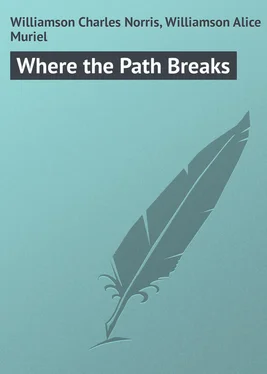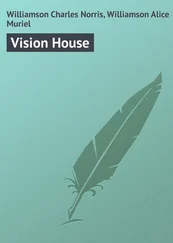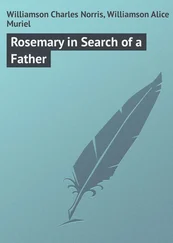Charles Williamson - Where the Path Breaks
Здесь есть возможность читать онлайн «Charles Williamson - Where the Path Breaks» — ознакомительный отрывок электронной книги совершенно бесплатно, а после прочтения отрывка купить полную версию. В некоторых случаях можно слушать аудио, скачать через торрент в формате fb2 и присутствует краткое содержание. Жанр: foreign_prose, на английском языке. Описание произведения, (предисловие) а так же отзывы посетителей доступны на портале библиотеки ЛибКат.
- Название:Where the Path Breaks
- Автор:
- Жанр:
- Год:неизвестен
- ISBN:нет данных
- Рейтинг книги:5 / 5. Голосов: 1
-
Избранное:Добавить в избранное
- Отзывы:
-
Ваша оценка:
- 100
- 1
- 2
- 3
- 4
- 5
Where the Path Breaks: краткое содержание, описание и аннотация
Предлагаем к чтению аннотацию, описание, краткое содержание или предисловие (зависит от того, что написал сам автор книги «Where the Path Breaks»). Если вы не нашли необходимую информацию о книге — напишите в комментариях, мы постараемся отыскать её.
Where the Path Breaks — читать онлайн ознакомительный отрывок
Ниже представлен текст книги, разбитый по страницам. Система сохранения места последней прочитанной страницы, позволяет с удобством читать онлайн бесплатно книгу «Where the Path Breaks», без необходимости каждый раз заново искать на чём Вы остановились. Поставьте закладку, и сможете в любой момент перейти на страницу, на которой закончили чтение.
Интервал:
Закладка:
The man in bed tried to answer. His voice came in a weak whisper. This surprised him, and made him ashamed. “Very – well,” he heard himself say, as he had seemed to hear himself speak in the dream which was gone now, far away, out of reach.
“Good!” said the surgeon. “Can you tell me your name?”
The sick man thought for a moment, and the question went echoing through his brain as a voice calling one who is absent echoes through a deserted house. Knowledge of his helplessness brought a sense of physical disintegration, as if the marrow of his bones was melting.
“Never mind!” the shock-headed surgeon said, in a quiet, reassuring tone. “It’s all right. You’ll remember by and by, when you’re stronger. Don’t worry about yourself. I’ve performed an operation on you, which is known as trepanning. That was some days ago. It has been a success. But we will let you rest a while longer before we bother you with questions. The only thing is, the sooner we learn your name the sooner we can take steps to let your people hear that you’re alive. It’s a long time since you were wounded: eight months. We couldn’t operate on your head till now. There were too many other things to mend about you! Somebody must be anxious. Go to sleep again when you’ve had your food, and perhaps the past will all come back to your mind. But if it doesn’t, don’t make an effort. That will do you harm.”
The sick man expressed his thanks with the faint ghost of a smile. When the nurse had fed him with warm liquid, which he drank through a tube without lifting his bandaged head from the pillow, he closed his eyes and tried to find his way into the dream again. But the door of the dream was shut. He could see only the face of the girl. She alone remained to him, as if she had lingered and found herself locked out when the dream-door shut. She had no name, and he had none. But that seemed to be of little importance. It was easy to obey the surgeon and not make an effort. The difficult thing would have been to struggle toward any end. He felt that to do so would shatter his brain. And as he was very sure nobody cared what had become of him, there was no need. Why he was so sure of this, he could not tell. But something inside him, which remembered things he had forgotten, was absolutely sure.
How long his lethargy of mind and body lasted, he did not know. Days faded grayly into nights, and nights brightened grayly into days. Neither the surgeon nor the two nurses who had charge of him asked further questions. He took no real interest in anything except the effort to find his way back into the lost dream, which he could never do; and sometimes even the beloved face was blotted out. But at last, the objective began to dominate the subjective in the man. He gave a little thought to his surroundings. He noticed his neighbors who occupied the beds near him, and listened dully when they talked to the nurses. They were all Germans. One day he asked the nurse with the patient eyes, if there were any other Englishmen besides himself in her charge. And as he spoke the word, with confidence which he could not analyze, it sent a faint thrill through his veins, a sense of unity with something. “Englishmen!” He was an Englishman.
He had to speak in German, for the nurse had no other language. Oddly enough, it seemed easy to make her understand.
“We had four Englishmen with you when you came,” she replied. “They are – gone now.”
He understood that they were dead, and that she did not like to tell him so. He smiled faintly, but asked no more questions then.
Next, he wanted to know where the hospital was, and how long he had been in it.
“You are in Brussels,” the nurse told him. “This used to be a restaurant. All the hospitals were full. You have been here only a few weeks, but we had heard of you, for yours was a wonderful case. Many doctors have talked about it. Just before your operation, you came to us. You were brought to Herr Doctor Schwarz for that. He is a great man for the brain. You were lucky to have him to operate. It was thought you might be an officer, because you spoke both German and French, when you didn’t know what you were saying. A bit of bone pressed on the brain. Your head had been hurt. And you had many other wounds, which another great surgeon had cured, when every one else said you would surely die. That was why they waited so long before operating on your brain. You had suffered so much already. You had to grow strong after what you had gone through, and get over the nerve-shock, which was worst of all.”
“Let me see, how long did Dr. Schwarz tell me it was, before they operated?” he asked.
“Eight months,” the nurse answered reluctantly, as if she feared to excite him, yet saw no real reason why, now that he was getting well, he might not hear all the truth about himself. Besides, it might help him to remember the past. She knew that Dr. Schwarz was anxious for him to do so now. He had always been an extremely interesting and rather mysterious “case,” sent from a distance by a brother surgeon to Schwarz, and specially recommended to his attention. “Eight months,” the woman repeated. “I think you were wounded in some battle early in August. We have the record that came from the first hospital where you were. Now it is the 15th of April.”
“Eight months,” the man counted dreamily with his fingers. “Why don’t they know whether or not I was an officer?”
“It was like this,” the nurse explained, with her stolid yet kindly and truthful look; “it was like this: Your cavalry and our cavalry fought. That is the account we have, though it is not very clear. You were getting the better of us, but our artillery came up and our Uhlans were ordered to retreat. When they were safely out of the way, your lancers were shelled. I think they were cut to pieces. Nobody on either side could get at the dead and wounded for days. When they did go to help the living, it was our Germans who went. Most of the English were killed. You and the others who lived (unless a few escaped), were brought to a hospital of ours, in the north of France. Our soldiers would not do such a thing, so it must have been prowling people – thieves – who stripped off your clothes. One reason why our doctors thought you might be an officer, even before you spoke, was because the little finger of your left hand had been partly cut off. It had been done with a knife. That seemed as if you must have worn a valuable ring, so tight it couldn’t be got off in a hurry.”
“My mother’s ring,” muttered the man. The words spoke themselves. Again, it was not he who remembered, but something which seemed to be separate and independent, hiding inside him, though not in his brain. It knew all about him, but would not give up the secret. Impishly, it threw out a sop of knowledge now and then, just as it pleased. The nurse tried to encourage this Something to go on, but it would not be coaxed. When she repeated the conversation to Schwarz afterwards, however, he said, “That’s encouraging. Don’t press him too much. Let body and brain recover tone. Then we’ll try more suggestions. It’s the most interesting case we’ve had. What is it to me that he’s friend or enemy? Nothing. He’s a man. I shall think of a way to set up the right vibrations.”
The way he thought of was to commandeer a bundle of English papers which had been passing from hand to hand in Brussels. These papers had been smuggled into the town by a German who had escaped from a concentration camp in England. He was a doctor, and had got into Belgium through Holland. Such newspapers as he had were very old ones, but that did not matter, because the man in whom Schwarz, the surgeon, was interested had lost touch with the world since a day soon after the breaking out of war. He must have been among the first troops sent over from England to France, and rushed straight to the front.
Читать дальшеИнтервал:
Закладка:
Похожие книги на «Where the Path Breaks»
Представляем Вашему вниманию похожие книги на «Where the Path Breaks» списком для выбора. Мы отобрали схожую по названию и смыслу литературу в надежде предоставить читателям больше вариантов отыскать новые, интересные, ещё непрочитанные произведения.
Обсуждение, отзывы о книге «Where the Path Breaks» и просто собственные мнения читателей. Оставьте ваши комментарии, напишите, что Вы думаете о произведении, его смысле или главных героях. Укажите что конкретно понравилось, а что нет, и почему Вы так считаете.











